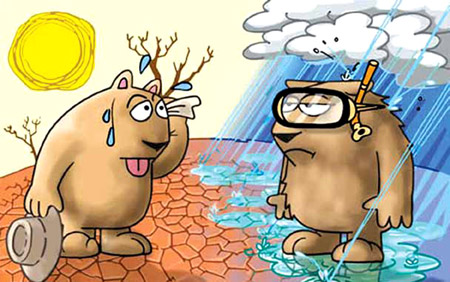|
Workshop on decentralisation and climate change :
Public awareness vital to overcome climate change effects
By Anuradha KODAGODA
 It is a well known fact that climate change is one of the topics
which has the least priority especially in third world countries. Even
through the media, the topic of climate change is not addressed. Unlike
in European countries, the developing country's societies are highly
influenced by its political atmosphere and it is obvious that topics
such as social welfare and environmental protection receive the least
priorities. It is a well known fact that climate change is one of the topics
which has the least priority especially in third world countries. Even
through the media, the topic of climate change is not addressed. Unlike
in European countries, the developing country's societies are highly
influenced by its political atmosphere and it is obvious that topics
such as social welfare and environmental protection receive the least
priorities.
Nevertheless, is climate change, a topic which we can ignore? Adverse
effects of climate change is not any one country's fault, nor any one
country's responsibility. Though we are relatively small in population
and also with the industrialisation, we can't ignore the fact that we
too are equally responsible for this matter. It requires sacrifices from
everyone.
When considering this timely topic, the effort taken by the UN
Habitat to create awareness by alerting the communities and the
precautions they have taken through various projects which operated in
the country, cannot be ignored.
The recent workshop on Decentralisation and Climate Change jointly
organised by United Nations Human Settlement Program (UN Habitat) and
Management Resources for Good Governance (MaRGG) brought together
decision-makers, practitioners and stakeholders to share and explore the
country situations and implement successful decentralisation approaches
of sub-national and local government to adopt participatory local
initiatives to address the climate change issue.
The main dialogue was based on the styles and scope of
decentralisation processes and climate change of Sri Lanka and seven
selected countries in the region namely Cambodia, Lao DPR, Myanmar,
Nepal, the Philippines, the Pacific Islands and Vietnam.
 "The main reason for addressing the climate change is to prepare
cities and local governments for climate change and also to support the
urban communities and sectors through infrastructure adjustments which
should be adjusted to prevent climate change. However, this particular
workshop is to elaborate the role of local government and national
government linkage and that's why the workshop is under the banner of
'decentralisation and Climate Change'. "The main reason for addressing the climate change is to prepare
cities and local governments for climate change and also to support the
urban communities and sectors through infrastructure adjustments which
should be adjusted to prevent climate change. However, this particular
workshop is to elaborate the role of local government and national
government linkage and that's why the workshop is under the banner of
'decentralisation and Climate Change'.
However, it is not much to promote decentralisation but only to
understand the issues in a meaningful way where the local government can
adapt to international climate change policies, and at the same time
adapting with national global policy and strategy to make sure that the
local government cities and towns are prepared for climate change and
they operate according to a national framework," talking exclusively to
the Sunday Observer Bernhard Barth, Human Settlements Officer, Training
and Capacity Building Branch (TCBB), Global Division of UN Habitat said.
"In addition we need to develop right communication at all levels of the
government with its all divisions of communities which we feel as
lacking at the moment. For ages climate change has been identified only
as an international issue and not as a local issue, however I think it's
now slowly changing and people are trying to understand this as a
national issue.
"In Sri Lanka so far we have been working primarily in Negombo and
Batticaloa and recently started working in six cities. The local
government is very much interested and they want us to locate in war and
tsunami-affected areas. Although it's nothing to do with climate change
we do awareness programs for natural disasters. Although the local
government is quite interested in engaging with us, for them it's still
a challenge when developing comprehensive plans which goes hand in hand
with their current development plans. However, by working closely with
local government of Sri Lanka we hope to fulfil the objectives of
preparing towns and cities for climate change," Bernhard said.
It is quite important to introduce an education system which
encourages collaborative problem solving and decision making and also a
system to incorporate national level structures and decisions at the
national level for simpler and more transparent incorporation at the
local level are identified as an essential task.
Our life styles and consumption patterns determine our ecological
footprint. With rapidly degrading environment, particularly in cities,
caused by over-extraction of natural resources and excessive pollution,
and threats caused by changing climate, there is an urgent need to
re-think the way we live our lives. It is important to realise that
little things we do can make a big difference for us as well as our
planet.
There are more than enough commonalities around the region which are
suffering from problems such as lack of clean drinking water, highly
polluted rivers, unmanaged waste, deteriorating air quality and poor
energy supply. Most of us either blame everyone else except ourselves
for getting us in the situation or simply shrug our shoulders and
ignore. What we do not realise is that when pointing a finger at
someone, three fingers are actually pointing back at us. Many of us also
talk about solutions such as 3Rs (Reduce, Reuse and Recycle) of waste,
recycling and rainwater harvesting, but when it comes to practising what
we preach we often shy away.
It is time to 'walk the talk' and take action at individual as well
as household and community level. |

